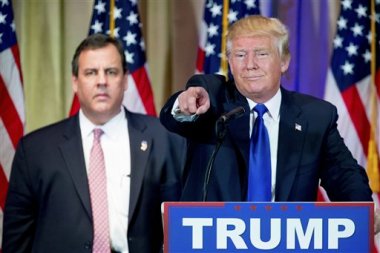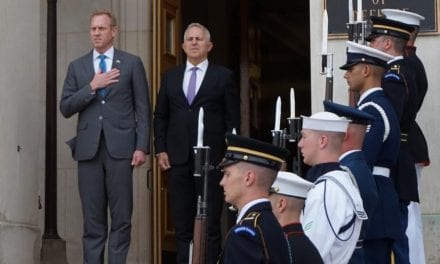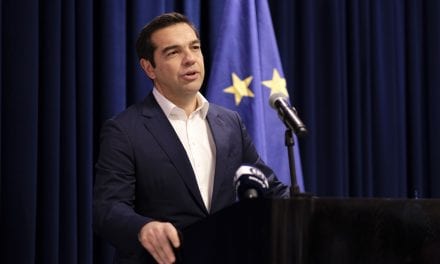By ANNA PALMER and BRIANNA GURCIULLO
The GOP is struggling to raise cash from corporate donors, and now Democrats are feeling the pinch.
Republicans have been struggling for months in the shadow of Donald Trump to get corporate sponsors to pony up for their convention. Now Democratic fundraisers are feeling their pain, too.
Several Fortune 500 companies — including Bank of America, Duke Energy and Time Warner —are taking a pass on chipping in for the Democratic convention in Philadelphia or, with just 100 days to go until the event, won’t say whether they’ll participate. Target, which has had a presence at both parties’ conventions in the past, is joining other companies in skipping this summer’s events in Philadelphia and Cleveland.
None of the firms are publicly pointing to Trump as the reason they’re staying away. But the GOP’s more well-documented struggles appear to be taking a toll on Democrats, since many companies prefer to give to both conventions or neither in order to project an image of balance.
Democratic Party officials expect the convention to cost $84 million. The host committee says it has brought in roughly $40 million in pledges and contributions so far.
“It’s easier to say ‘no’ than ‘yes’ at this point,” said Michael Meehan, a veteran Democratic political operative who worked on John Kerry’s 2004 presidential bid. “Some of our corporate clients have said they are still planning to do both, but reserve the right that we may not send anybody in the end. Come July, their executives might stay home and watch.”
In 2012, Duke Energy provided a $10 million loan to Democrats for its convention in the company’s hometown of Charlotte, which it later forgave. This year, though, the energy giant still hasn’t said whether it will participate in either convention. Duke does not have a timeline for when it will decide, said spokesman Dave Scanzoni. He declined to comment on the factors that company officials are weighing, but said “there’s no relationship” between the lack of a decision and the field of candidates.
Bank of America, which contributed $5 million in Charlotte, is also remaining mum on its 2016 convention plans. “At this point, we wouldn’t have anything to share on that,” said company representative Ferris Morrison.
Time Warner Cable, on the other hand, has already decided against reupping for the conventions. The company, which has a large presence in Charlotte, gave $600,000 to the Democratic convention four years ago. Company spokesman Bobby Amirshahi said Time Warner is “not sponsoring or supporting either political convention this year. And we don’t have plans to send employees to either convention.” The telecom firm is in the final stages of a merger with Charter Communications.
Similarly, tobacco giant Altria, which has contributed to the Republican host committee in the past and also cut checks to underwrite major parties at the Democratic convention in Charlotte, said it isn’t giving to either convention committee this time. Target has no plans to participate in or contribute to either convention, officials said.
Freed from President Barack Obama’s policy in 2008 and 2012 of not accepting corporate and lobbyist donations to fund the party’s convention, Democrats were hoping for a gush of cash for this summer’s festivities in Philadelphia.
But several Democratic lobbyists who represent more than a dozen Fortune 100 companies said they’ve received fewer requests for hotel room packages and tickets for parties than in the past. Top executives, likewise, are not planning to flock to Cleveland or Philadelphia for the event.
“People are more hesitant this time,” said one the lobbyists, who has worked at previous conventions. “And the clients that end up going don’t want to be featured as a marquee sponsor. Before, you would be fighting for signage. Now it’s about, let’s not fight [for] any branding.”
That hasn’t stopped the party committees from publicizing high-priced events for donors. The Democratic Congressional Campaign Committee is organizing a concert reception with House Minority Leader Nancy Pelosi (D-Calif.), tea time honoring women in the Democratic caucus and a “political update” with DCCC Chairman Ben Ray Lujan (D-N.M.).
Top-tier DCCC donors — those who commit to give $210,000 to the party committee for the election cycle, or raise that amount from others — will be eligible for a “1776 Package” that includes two hotel rooms, DNC credentials, access to hospitality areas, skybox passes and eight tickets to DCCC events.
The DNC also has four fundraising packages — dubbed the “Rittenhouse Square” level, for the tony Philadelphia neighborhood — for those who raise $1.25 million or contribute $467,000. It includes VIP credentials, photo opportunities, 20 VIP tickets to a welcome party, and finance committee meetings and roundtables with high-level officials.
The Republican drag isn’t the only thing hampering Democrats’ fundraising efforts. Their drawn-out primary has also been a factor, since donors are typically more willing to give once there’s a nominee. Major Hillary Clinton backers are less likely to cut six-figure checks until she’s locked down the nomination.
On top of that, the competition for dollars this year is more intense than ever. Donors are no longer limited in how much they can give to candidates and national party committees, but some may be feeling taxed by all the requests.
Party officials insist they’re meeting their fundraising benchmarks and say this summer’s convention in Philadelphia will be the party’s first that won’t require a last-minute injection of cash to pay the bills.
“We’ve hit every target that we’ve set out to hit and that’s because of tremendous support locally and nationally from our sponsors,” said Kevin Washo, executive director for the Democratic host committee, which he said has raised “north of $40 million in pledges and money in the door.”
Washo said the “inventory” for sponsorships is already running low. The host committee, however, declined to name any of its donors. It is not required to disclose contributions until 60 days after the convention.
Veteran Democratic fundraiser Jason O’Malley is leading the host committee’s money chase. Known as a relentless fundraiser, he has put in place an aggressive schedule to try and ensure the money materializes and pledges don’t fall off.
Washo declined to say whether Trump has had an effect on convention fundraising, but noted “there’s a lot of people who have never given before that have shown great support for our convention. I think it goes both ways.”
The host committee has forged stronger ties with the Democratic National Convention Committee — the two staffs share the same office space and meet daily — and unions this time around. Organized labor was hesitant to get involved in the 2012 convention because of strong anti-union laws in North Carolina. Washo described union support this time as “one of the real blessings” of holding a convention in Philadelphia.
AFL-CIO did not respond to a request for comment about their participation in Philadelphia. An SEIU official said the union will “present our story of inclusion and opportunity” at the convention, but declined to provide details.
Of course, not all companies are taking a pass.
Biotechnology industry company Amgen said that it plans to sponsor events in Cleveland and Philadelphia.
“Amgen recognizes the important role the presidential nominating conventions have in our democracy and has a long history of supporting both the Democratic and Republican conventions,” spokeswoman Kelley Davenport said. “For both conventions, we are looking at different events and forums which support Amgen’s priorities. Nothing more definitive at this time.”
Amgen contributed $400,000 in 2012 to the Tampa convention. It did not give to the Democratic convention in Charlotte.
Anheuser-Busch, which provided a $10,000 in-kind contribution in 2012 to the Republican convention, said it would consider a similar donation this year. Spokeswoman Gemma Hart said, “It’s too early and we haven’t decided whether or not we will have company officials at the conventions.”



















